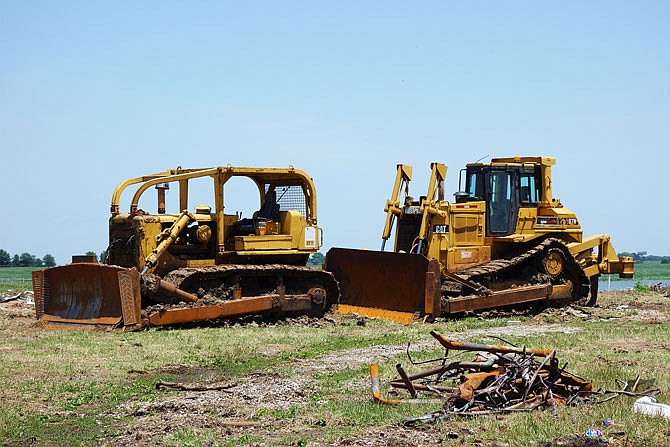KINGDOM CITY, Mo. - Anti-CAFO signs dot the road between Fulton and the future home of Callaway Farrowing.
It's a battle local activists have lost. Callaway Farrowing owner Eichelberger Farms, based in Wayland, Iowa, broke ground this week on the 20-acre property west of Kingdom City. Once completed, the confined animal feeding operation will house some 10,000 sows. Sows leaving the farm will head to St. Joseph-based Triumph Foods, an exporter of pork products.
"We're pretty disappointed," said Jeff Jones, a leader of the Friends of Responsible Agriculture group. "The whole community is. I always thought this was a government by the people, not by the money."
The future facility lies on County Road 227 just south of Interstate 70.
"It's three-tenths of a mile from my house," Jones said.
As of Thursday, Callaway Farrowing was a muddy field occupied by a number of earth-moving machines. The site used to house Horstmeier Farms, but the old farmhouse now has been demolished.
A large black SUV with Iowa plates was parked just off the road. Its occupant identified himself as the general contractor for Eichelberger Farms. He declined to give his name and said this soon into the project, there wasn't a set timeline for completion.
Eichelberger Farms spokespersons could not be reached for comment.
Jones and other area residents have expressed concerns about odor and potential contamination from the hogs' waste. Activists also have worried about where manure from the CAFO will be spread.
County recorder Christine Kleindienst said as far as she knows, people who grant easements to farms for manure spreading aren't required to record that information with the county. She said she'd inquired with the Callaway County Commission and they hadn't heard of such a requirement either.
"Nobody's come into here asking about easements," she said.
Legal struggle
Construction on the site follows a nearly four-year legal conflict between FORAG and Callaway Farrowing.
The Department of Natural Resources initially issued the farm's permit in 2014.
In order to build the farm, Callaway Farrowing needed its permit approved by the Missouri Clean Water Commission. Two members of the seven-member commission visited the site in 2015, and in July 2016, Cole County Circuit Judge Dan Green ruled this disqualified them from voting on the permit.
On Oct. 5, 2016, the five remaining members voted 3-2 to approve the permit.
"The Clean Water commissioners who were voting on our side got replaced," Jones said.
However, FORAG sued on the grounds state law requires the approval of at least four members for a final action. Green agreed Dec. 21, ordering then-Clean Water Commission Chairman Bobby Bennett to announce the vote failed.
The legal spat over the vote continued until October 2017, when a judge dissolved the writ blocking the commission from voting on the issue. FORAG appealed, but in December 2017, a three-judge appeals court panel once more blocked the writ, saying the Friends group had used the wrong legal procedure to block the permit.
FORAG's attempt to transfer the case to the state appeals court in Kansas City failed in April, when the Missouri Supreme Court rejected the request. The Clean Water Commission approved Callaway Farrowing's permit.
Correction: The original version of this article about Callaway Farrowing had incorrect information on the former Horstmeier Farms property upon which the CAFO will be built. That particular property actually only held old farm buildings, according to a Horstmeier member.

